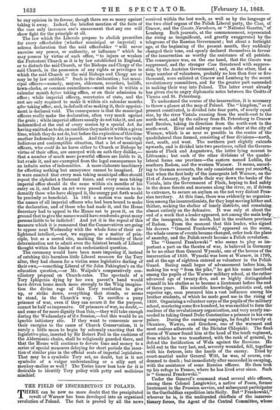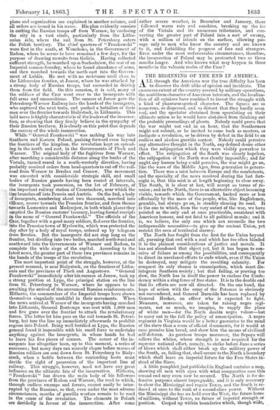THE FIELD OF INSURRECTION IN POLAND.
TIIHERE can be now no more doubt that the precipitated revolt of Warsaw has been developed into an organized revolution of Poland. The fact is proved by all the news received within the last week, as well as by the language of the two chief organs of the Polish Liberal party, the Czas, or Cracow, and the Gazeta Narodowa, or "National Gazette," of Lemberg. Both journals, at the commencement, represented, the rising as insignificant, and greatly exaggerated by the telegrams of the Russian Government ; but about a fortnight ago, at the beginning of the present month, they suddenly- changed their tone, and openly declared themselves in favour of the insurrection as worthy the assistance of all patriots.. The consequence was, on the one hand, that the Gazeta was suppressed, and the stronger Gras threatened with suppres- sion, by the Austrian Government ; and, on the other, that a large number of volunteers, probably no less than four or five- thousand, were enlisted at Cracow and Lemberg by the secret revolutionary committees, and for the greater part succeeded; in making their way into Poland. The latter event already has given rise to angry diplomatic notes between the Omits of Vienna and St. Petersburg.
To understand the course of the insurrection, it is necessary to throw a glance at the map of Poland. The "kingdom," as at present constituted, is divided into four parts, of nearly equal size, by the river Vistula running from the south-east to the- north-west, and by the railway from St. Petersburg to Cracow and Breslau, taking its direction from the north-east to the south-west. River and railway cross each other at the city of Warsaw, which is as near as possible in the centre of the- quadrilateral thus formed, consisting of four divisions—north, east, south, and west. The northern part slightly extends- upwards, and is divided into two provinces, called the Govern, meats of Flock and Augustowo, the latter lying nearest to, Lithuania ; but each of the other divisions of the quadri- lateral forms one province—the eastern named Lublin, the southern Radom, and the western Warsaw. It seems, accord- ing to German accounts, the only consistent ones yet receivtd, that when the first body of the insurgents left Warsaw, on the- 21st of January, they made their way down the banks of the- Vistula, into the Government of Flock, hoping to find safety in the dense forests and morasses along the river, or, if driven to extremes, to secure an asylum on the not very distant Prus- sian territory. At this time, there was evidently no organiza- tion among the insurrectionists, for they kept moving hither and thither, seeking the shelter of lonely districts, and remaining, almost entirely on the defensive. It was only at about the end of a week that a leader appeared, not among the main body_ of the insurgents, in the north, but in the southern province: — of Radom. From the moment that this leader, who grilled his decrees "General Frankowski," appeared on the scene,, the whole course of events became changed, order took the place of anarchy, and the Polish revolt became a Polish revolution. The "General Frankowski" who seems to play so im- portant a part on the theatre of war, is believed in Germany to be no other than General Wysozki, one of the heroes of the insurrection of 1830. Wysozki was born at Warsaw, in 1799,. and at the age of eighteen entered as volunteer in the Polish Guard. Seeing small hopes of advancement before him, in making his way "from the pike," he got his name inscribed among the pupils of the Warsaw military school, at the rather- advanced age of twenty-five, and so highly distinguished himself in his studies as to become a lieutenant before the end of three years. His scientific knowledge, patriotic zeal, and. superior age, soon procured him a vast influence among his brother students, of which he made good use in the rising of 1830. Organizing a volunteer corps of the pupils of the military school, mustering some five hundred, he was enabled to form the. nucleus of the revolutionary organization, and very nearly suc- ceeded in taking Grand Duke Constantine a prisoner in his own palace. During the ensuing campaign, he fought bravely at. Okuniew, Wawre, and Grochow, one of the warmest and most zealous adherents of the Dictator Chlopicki. The final storm of Warsaw found him at the head of the tenth regiment,. from which he was transferred, with the rank of general, ta defend the fortification of Wola against the Russians. He- held out to the very last, and, severely wounded, fell, together with his fortress, into the hands of the enemy. Tried by court-martial under General Witt, he was, of course, con- demned to death ; but immediately after succeeded in escaping, with the assistance of some Russian officers. He then took up his refuge in France, where he has lived ever since. Such is "General Frankowski."
Under the General's command stand several able officers, among them Colonel Langiewicz, a native of Posen, former lieutenant in the Prussian service, and subsequent participator in the Graribaldian expedition into Sicily. But" Frankowski," whoever he is, is the undisputed chieftain of the insurrec- tionary forces, the Agent of the Central Committee, whose
plans and organization are explained in another column, and all orders are issued in his name. His plan evidently consists in cutting the Russian troops off from Warsaw, by enclosing the city in a vast circle, particularly from the Lithu- anian side, where the rail from St. Petersburg enters the Polish territory. The chief quarters of "Frankowski" were first in the south, at Wonchoko, in the Government of Radom, where he seems to have remained a few days, for the purpose of drawing recruits from Galicia. Having collected sufficent strength, he marched upon Suchodniow, the seat of an Imperial cannon-foundry, where he found abundance of arms, and then marched towards the north east into the Govern- ment of Lublin. He met with no resistance until close to the Lithuanian frontier, at Janow, where he was attacked by a strong body of Russian troops, but succeeded in driving them from the field. On this occasion, it is said, many of the soldiers of the Czar went over to the insurgents with full arms and ammunitions. The success at Janow gave the Petersburg-Warsaw Railway into the hands of the insurgents, who captured the next train, and pushed a battalion of their men over the frontier towards Bialystock, in Lithuania. This bold move is highly characteristic of the leaders of the insurrec- tion, as showing that they firmly believe in the sympathy of their Russian brethren. It is clearly on this point that depends the success of the whole insurrection.
While "General Frankowski" was making his way into Southern and Eastern Poland, pushing forward even beyond the frontiers of the kingdom, the revolution kept on spread- ing in the north and east, in the Governments of Flock and Warsaw. The original body of the fugitives from Warsaw, after marching a considerable distance along the banks of the Vistula, turned round in a south-westerly direction, having probably received orders from head-quarters to cut off the rail- road from Warsaw to Breslau and Cracow. The movement was executed with considerable strategic skill, and small bodies of Russian guards having been routed at intervals, the insurgents took possession, on the 1st of February, of the important railway station of CzenstochoNv, near which the tine branches off into Prussia and Austria. On the 2nd, a body of insurgents, numbering about two thousand, marched into Olkusz, riearer towards the Prussian frontier, and from thence towards Losnowicz and Modrzejow, in both which places they emptied, the Russian customs' treasury, leaving formal receipts in the name of "General Frankowski." The officials of the Czar, together with a good many soldiers, fled over the frontier, into the Prussian town of Myslowitz, which was protected the day after by a body of royal troops, ordered up by telegram from Breslau. But the insurgents did not stop long on the frontier, but dividing into two bodies, marched northward and southward into the Governments of Warsaw and Radom, to complete the wide siege of the capital. According to the latest news, the greater part of these two provinces remains in the hands of the troops of the revolution.
The most important point of the struggle, however, at the present moment, is near Bialystock, on the frontiers of Lithu- ania and the provinces of Flock and .A.ugustowo. "General Frankowski" immediately after his success at Janow, took up a strong position at Lypa, the principal station on the line from St. Petersburg to Warsaw, where he appears to be awaiting the arrival of the announced Russian reinforcements. Hitherto, the commanders of the Imperial troops have shown themselves singularly unskilful in their movements. When the news arrived at Warsaw of the insurgents having marched into Lithuania, General Bontemps was sent with 1,000 men end five guns over the frontier to attack the revolutionary forces. The latter let him pass on the rail towards St. Peters- burg, but tore the line up immediately afterwards to prohibit regress into Poland. Being well fortified at Lypa, the Russian general found it impossible with his small force to undertake anything against the insurgents, in whose hands he had to leave his five pieces of cannon. The career of the in- surgents has altogether been, up to this moment, a series of successes ; but many days can scarcely elapse before masses of Russian soldiers are sent down from St. Petersburg to Bialy- stock, when a battle between the contending hosts must decide the right of possession of the important line of railway. This struggle, however, need not have any great influence on the ultimate fate of the insurrection. Hitherto, " Frankowski " has drawn the main body of his followers from the provinces of Radom and Warsaw, the road to which, through endless swamps and forests, cannot easily be inter- rupted by the Russians, so that, even under the most adverse circumstances, months of guerilla warfare remain to be used in the cause of the revolution. The elements in Polanh are decidedly in favour of the insurrection. After some
rather severe weather, in December and January, there followed warm rain and sunshine, breaking up the ice of the Vistula and its numerous tributaries, and con- verting the greater part of Poland into a sort of swamp, with a million of islands on the surface, allowing pas- sage only to men who know the country and are knows' to it, and forbidding the progress of foes and strangers. Even under the most unfavourable circumstances, therefore, the insurrection of Poland may be protracted two or three months longer. And who knows what may happen in three months in the volcanic realm of the Czar?































 Previous page
Previous page